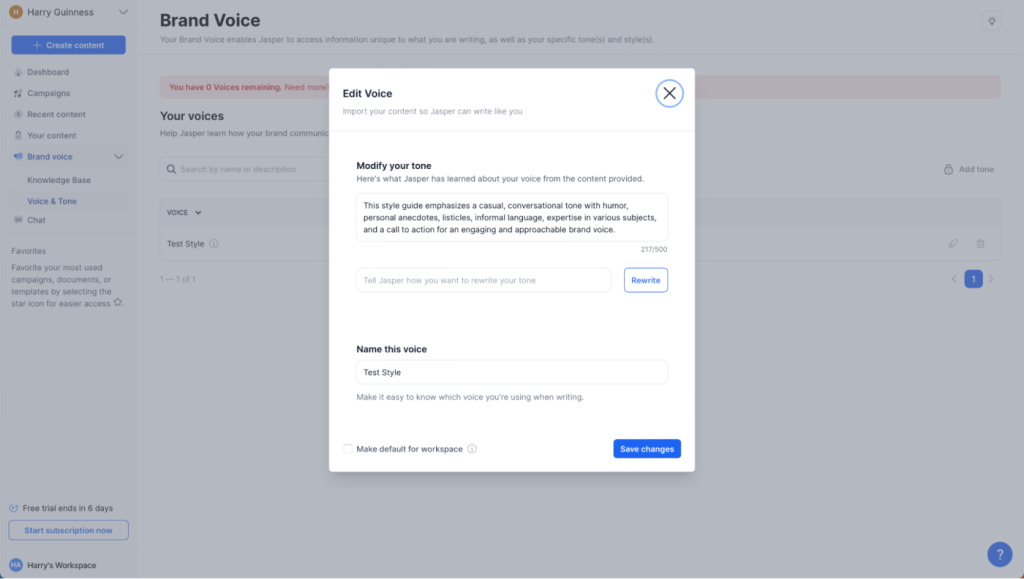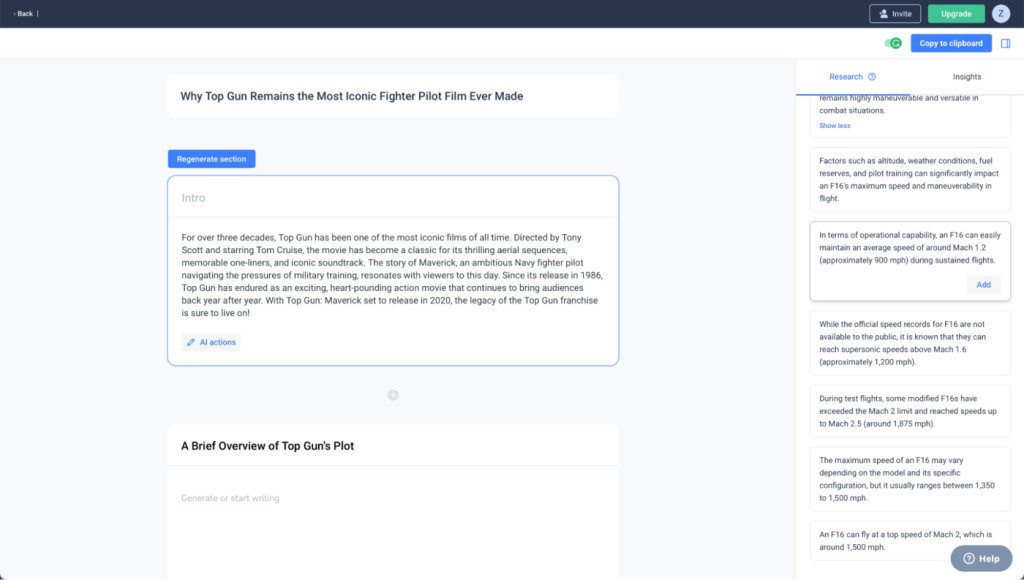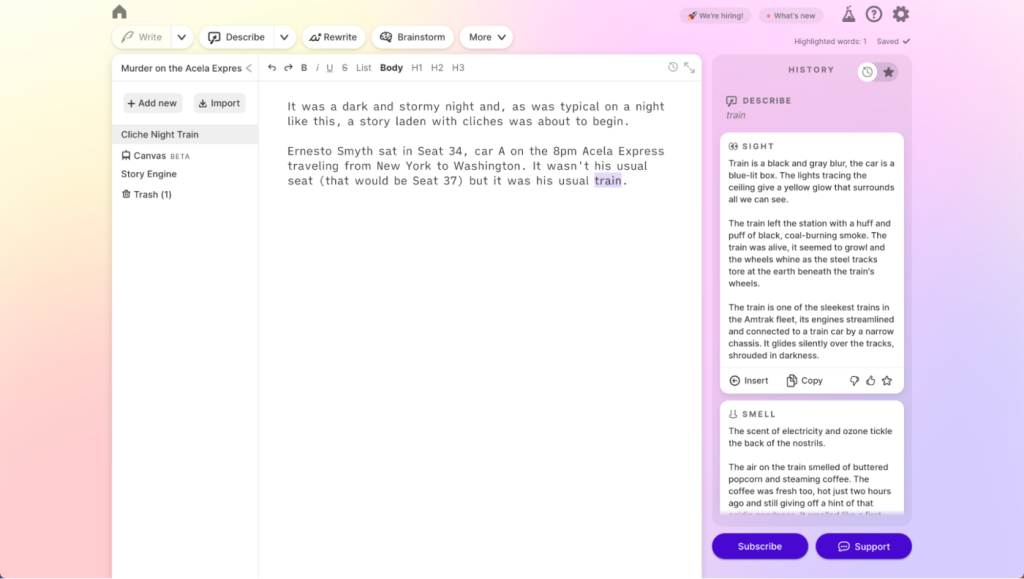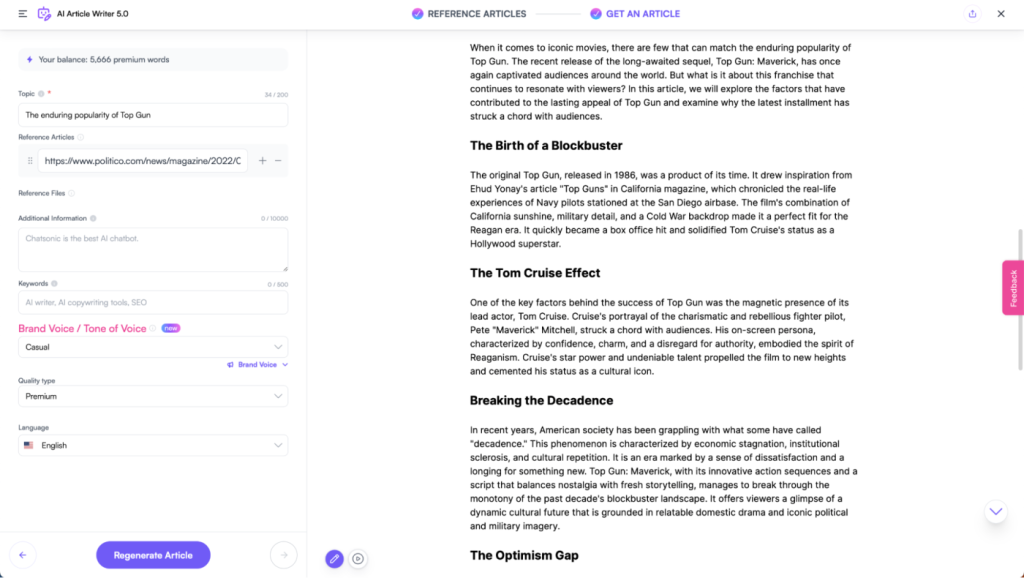Robin Khokhar
Robin Khokhar is an SEO specialist who mostly writes on SEO. Thus sharing tips and tricks related to SEO, WordPress, blogging, and digital marketing, and related topics.
I do not recommend using AI writing tools to write a whole article and publish it on the website. You will get...

Image Credits: canva
I do not recommend using AI writing tools to write a whole article and publish it on the website. You will get nothing publishing AI content on your website or any other websites. Your articles/content may get indexed but there is no way it ranks better on Google SERPs. Trust me, I have experimented and it turns out that Google’s E-E-A-T is much more clever and rank the content that meets the criteria.
I have been using AI tools to get the ideas. AI writing tools help me to get all things in one place and I don’t have to browse and read content on different sites. Thus saving me a lot of time. I will say these tools are amazing and recommend that you use them for analysis purposes and to make your job easy.
Artificial intelligence writing tools have been in the spotlight since ChatGPT debuted last year. They may not have conquered the globe yet, but they are growing up fast and can be helpful (under the correct conditions). These AI Writing Tools, when used properly, can make your job easier and faster while also producing better, more consistent brand copy.
Naturally, any AI writing tool needs human oversight for the greatest outcomes. Despite its ability to mimic human writing, it often produces generic and inaccurate content when left unchecked. Now that AI technologies are becoming more prevalent, people are also likely to recognize when information is artificially produced and lacks personality. They may even be wary of content that is missing something.
This type of artificial intelligence generative technology has been my focus for nearly ten years. The whole thing has piqued my professional attention since AI is allegedly attempting to displace me from my job. Regardless, I feel secure at the moment. Although these AI writing tools are becoming more and more remarkable, you still need to engage with them instead of simply letting them vomit out their ideas.
If you’re seeking an AI content generator to speed up the writing process, create more engaging material, and publish blog posts more frequently, you’ve found the ideal spot. Now, let’s begin.
Doing a Google search for “artificial intelligence writing software” can get you dozens of results, many of which share features. An important rationale underlies this: Backend large language models (LLMs) are used by 95% of these AI authoring tools.
Even larger apps are starting to use LLMs like Claude or incorporating their fine-tuning. Despite their best efforts, most of these products are nothing more than wrappers for OpenAI’s GPT-3 and GPT-4 APIs, albeit with some additional functionality added on top.
This is not to imply that there are no worthwhile AI-powered writing apps. While ChatGPT and OpenAI’s playground let you generate text using GPT, their workflows are significantly more pleasant. Plus, with the best tools, you may define a “voice” or set of rules that will be applied to your generated content. However, the output quality is different from what differentiates these apps. Except for a handful of apps that utilize various LLMs, the results you obtain from the same prompt will be consistent across all of them. These tools stand out because it is simple to incorporate AI text production into a real workflow.
In terms of the LLM models themselves, they can anticipate the most appropriate phrases to use in response to a given prompt. It completely depends upon analyzing the data they were trained on. Books, articles, and other materials from various genres, styles, and subjects make up this training data set, as does an enormous quantity of material from the public domain. In essence, LLMs were given carte blanche to process humanity’s collective wisdom to construct a deep-learning neural network. It is an intricate, multi-layered, weighted algorithm mimicking how the human brain works. Indeed, that is the type of behavior required to design a machine to produce poor poetry.

Jasper, formerly known as Jarvis, is one of the most robust and feature-rich artificial intelligence content generators. It feels more like a mature tool than most of the apps I examined because it was among the first wave of programs developed on top of GPT and has been around for a while. In the time after I initially made this list, it has been evolving and expanding.
Try Jasper out as soon as possible if you own a business and money isn’t your main concern. It has shifted its emphasis from producing generic AI content to primarily concentrating on marketing initiatives. That’s not necessarily a negative thing, but it does mean that individual creator plans start at $49/month, and the team plans cost $125/month.
Additionally, Jasper is now more than simply a GPT software. It asserts that “you get the highest quality outputs and superior uptime” by integrating “several large language models,” such as GPT-4, Claude 2, and PaLM 2. I would say Jasper’s output is similar to other apps, but it provides some good options for ensuring your material is consistent with your brand.

If Jasper can do it, Copy.ai can do it, too. However, a browser plugin is currently unavailable, but other capabilities such as a chatbot, an infobase, and brand voices are available. It would be like McDonald’s to Burger King in Jasper’s world.
Copy.ai, like the Home of the Whopper, also caters to slightly diverse preferences. Copy.ai’s design is more appealing, but it caters to a somewhat different workflow. Contrasted with Jasper’s carefree approach, Copy.ai takes things a little more slowly, urging you to engage with its chatbot or utilize a template that poses thoughtful, in-depth inquiries. Using it while writing content for websites, captions for social media, product descriptions, and similar tasks is more practical. It could be annoying for lengthy content like blog entries and articles used for marketing purposes.
There is a significant price difference as well. Both services cost $49 monthly, but Copy.ai’s package has five user seats and limitless brand voices. Let me explain. It can save a lot of money for a small staff dealing with several companies. A free plan with Copy.ai that contains 2,000 words per month is also available if you’re seeking an AI writing generator.

Every app on our list has an AI that you can tell to include particular details or mention specific facts, but none of them are as easy to use as Anyword. Instead of being a terrifying beast that needs mysterious commands to be tamed, this AI is more like a helpful and somewhat capable subordinate that needs some oversight (and can even attempt to imitate your writing style and brand voice).
For example, you can use the Blog Wizard, one of its primary content construction tools. The setup process is similar to Copy.ai in that you must provide details about the blog post you want the AI to write. It includes any search engine optimization keywords you wish to target. After that, Anyword will give you several title options and an engagement score prediction to go with them.
After you’ve decided on a title (or come up with your own), it will offer an outline. Then you give it the go-ahead, it may either write a full 2,000-word blog post. You can also start with a blank page and give it more directions for each part of the outline, such as which facts to include, which style to use, and which details to encompass. However, you can also ask questions and get feedback from a research sidebar that looks like a chatbot. You have much control over the stuff you’re making, but it’s slower than most apps.

I doubt Sudowrite’s promotional material will be included in this compilation. Next, I gave it a go and…I’m fond of it. Sudowrite stands out from the rest of the tools on our list due to its specific target audience: fiction authors. There will be much debate because of that. According to several Very Online writers, Sudowrite is “an insult to writers everywhere” and is mainly seen as a hacking tool. Although it cannot be compared to a human author, it is entertaining, practical, and can assist with fiction writing.
The component that has garnered the most attention is the plot Engine. This lets you pen an entire novel in a matter of days by gradually creating each plot beat. It’s practical but requires a lot of guidance, and the final product will be strange. The tools that help with that, though, are what I like.

Despite the widespread use of GPT, the exact version used by each tool on this list often needs to be clarified. This is significant because the GPT-3.5 Turbo API starts at $0.002/1K tokens (around 750 words) for the most basic version. This goes up to $0.06/1K for GPT-4, and $0.12/1K for the most potent version. Given all this, it’s likely that most apps depend on one of the more basic (but still superb) GPT-3 models for text production rather than GPT-4.
Writesonic is the best program if you care about using the most recent and advanced AI model. It is clear the AI model Writesonic employs. For business plans, you can select between GPT-3.5 and GPT-4.
The additional power of GPT-4 will rely on the content you provide. Using GPT-4 through ChatGPT, I can say that the most recent model is more innovative and accurate. You will see slight improvement if you only produce low-stakes copy variations for your product listings. It may affect unique, lengthy blog postings. Whichever way you look at it, seeing clearly which model you’re using is a significant plus.
Because they did not fulfill my basic criterion, a handful of excellent AI text-generating programs that are worth examining were omitted from this list. Here are some other choices to consider if none of the AI writers I have shared meet your needs:
Artificial intelligence powers two search engine optimization tools: Surfer and Frase. You can optimize and improve your material, whether AI-generated or not. These two 2 tools are not AI writing tools and are just outside the scope of this list, but they can still help.
Recommended:
The Top 7 Free AI Tools That Will Make Your Life Easier.
The Best AI Tools You Can Use.